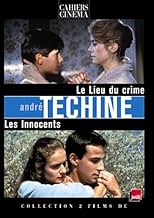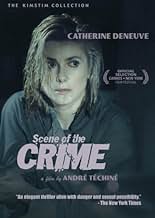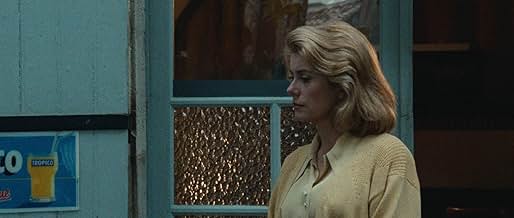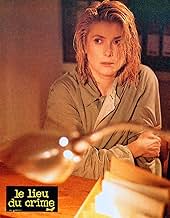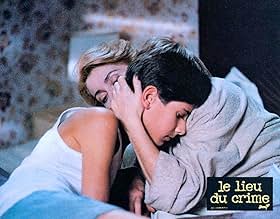Le lieu du crime
- 1986
- Tous publics
- 1h 30m
In the woods, a 13-year-old boy is grabbed by an escaped convict and told to bring money later that day. The boy does as he's told, only to be attacked by the convict's partner. A murder ens... Read allIn the woods, a 13-year-old boy is grabbed by an escaped convict and told to bring money later that day. The boy does as he's told, only to be attacked by the convict's partner. A murder ensues, and through happenstance, the murderer and the boy's mother form an alliance. All thi... Read allIn the woods, a 13-year-old boy is grabbed by an escaped convict and told to bring money later that day. The boy does as he's told, only to be attacked by the convict's partner. A murder ensues, and through happenstance, the murderer and the boy's mother form an alliance. All this takes place in four days during which the boy has his first communion, his separated par... Read all
- Director
- Writers
- Stars
- Awards
- 3 nominations total
- Suzan
- (uncredited)
- Director
- Writers
- All cast & crew
- Production, box office & more at IMDbPro
Featured reviews
Thomas's mother Lili (Catherine Deneuve) runs a club on the lake. After a violent altercation between Martin and his accomplice, an injured Martin goes to the club where he meets Lili. She feels attracted to him and decides to help Martin.
The film is full of nuances. The dynamics between Thomas and his parents, and his grandparents and parents is cleverly and in an understated manner brought to our attention. A good example of that is the strained atmosphere and undercurrents at the grand luncheon held to celebrate Thomas's first communion.
The soundtrack is outstanding too. In one of the scenes in the woods where suspense is reaching breaking point, André Téchiné uses the sound of cicadas and crickets building up to a crescendo to accentuate the tension. A very clever technique indeed.
Cinematography is of the highest quality too.
If there is one thing I will remember, it is the quality of the performances; they all are really good. Special mention must be made of the commanding performances by Catherine Deneuve, and by Danielle Darrieux who plays Thomas's grandmother.
I score this film a high 8/10.
Téchiné was renowned for his skill with actors and his style of direction suited her perfectly, so much so that four more collaborations were to come, notably 'Ma Saison Préférée'.
Although very much a vehicle for his leading actress, every character is well drawn in this portrait of fractured relationships and family disintegration. Téchiné excelled in depicting what one critic has termed 'outward conformity and inner confusion' and this film is certainly no exception.
Téchiné has elicited a marvellous performance from Nicolas Giraudi as her troubled teenage son whilst Victor Lanoux is pitch-perfect as her ex-husband. Claire Nebout makes a striking debut whilst the charismatic Wadeck Stanczac appears in his second film for this director. The grandmother who vainly tries to keep up appearances and preserve the family unit is played by Danielle Darrieux, a doyenne of French cinema and one of its true 'greats'.
The somewhat melodramatic material has been tempered by the literate script and by Téchiné's sensitive, elegant direction. The natural setting is beautifully captured by Pascal Marti whilst Philippe Sarde's score is effective but never intrusive.
Mlle Deneuve fondly remembered her participation in this as giving her a pleasure similar to that she had experienced when making 'Le Dernier Métro' and Téchiné freely admitted that their collaboration was the only area where his work showed continuity. Every director needs a Muse and some are lucky enough to find one.
"Scene of the Crime" has many of the virtues of "Wild Reeds,"--a film that will inhabit you for weeks after you've seen it--chief among them Techine's intelligence and sensitive handling of character and flair for melodrama. If Thomas Hardy were alive today, he'd probably be Techine's script-writer.
The film's two concerns are repression and freedom. Thomas--a sullen angry 13 year old--and Lili--his dreamy, distractedly neurotic mother-- undergo several collisions and unions with a young escaped convict and his friends: they are left to pick up the pieces and reconfigure their lives. Both mother and son are bound by a repressions whose roots are in family, community and religion. And each conflict with others binds them like a rope, so that Thomas futilely lashes out in anger while Lili attempts to lose (and in doing so) find herself with an act of impulsive negation. We could trace much of the repression toward the less likable characters--other criminals or family members--but doing so is futile. Techine understands what Renoir meant when said "everyone has his reasons," and so this film isn't about the difficulty of living with other people, but the difficulty of living in this universe.
Techine has often been called a "novelistic" director; meaning he takes you deep inside his characters' thoughts and motivations. This doesn't involve voiceover, just Techine's direction and the melodramatic plots that force their characters into confrontations ordained by the strength of their passions. Melodrama asks the most of its characters; requires them to feel and undergo all they can. It's numerous coincidences, and run-ins can seem like an amplified version of life's randomness and havoc. Techine's approach involves an analytical acceptance of melodrama's approach to narrative; a willing and measured use of its conventions, resulting in narratives that often seem more vivid than reality and paradoxically more truthful and satisfying. The emotions unearthed are more intense than those brought out by reality, but possess the inner truth of reality.
His technique is not flashy, attention-getting or hyper-formalistic: which means it works discreetly and extremely well. There is an ever-present analytical attention to the natural (and un-) surroundings that surround his characters, along with an intense intimacy toward them. He follows very few rules, and mixes quick cutting with measured long takes and a mobile camera. All this allows us to move back and forth and toward and away from his characters, sympathizing with them in close-up one moment, then judging at a detached angle or pan to another character's reaction. It is a wonderfully effective method, and constantly reminds us of each character's motivations (as do the relentless melodramatics.)
Techine's films aren't formally difficult, but if you lose track at one point it's hard to catch up, because his characters will have accumulated even more motivations and reactions by then. The intense sensitivity of his style allows us to accurately register each character's accumulating layer of emotions, which continually enlarge their motivations. To lose track of that accumulative process is probably what happened to Roger Ebert, who wrote the film should have been a gangster drama made in 1939, so that the melodramatic plot would seem more acceptable and Techine's moments of psychological insights wouldn't seem so "out of place." (The film IS primarily flawed in the sketchiness of the convict's lover and the overly-rushed pace of the climactic sequence.)He doesn't consider that the melodrama of the plot is precisely what allows for those moments of psychological insight. And desire for the film to be an old-fashioned crime noir seems inexplicable, when this is obviously a family drama where crime serves to provoke a shake-up and re-evaluation of family relations and the life-directions the characters have chosen. At the end of "Scene of the Crime" we're not sure whether Thomas and Lili have either recovered or damaged forever. And as Lili hauntingly remarks, after a certain point, losing and finding yourself may be the same process.
Let me make my bias clear: I am an Alfonso Cuarón fan, and his adaptation of Great Expectations remains my favorite. Still, even the subtle nod to Dickens in Téchiné's work had me wishing, "If only Téchiné would direct a Charles Dickens adaptation!"
With assistance from co-writers Pascal Bonitzer and Olivier Assayas (both of whom have since become directors themselves), Téchiné weaves narrative twists that obscure some of the plot's illogical turns, keeping the audience constantly guessing.
Pascal Marti's signature unsettling camera movements and deceptively simple editing style evoke the tension and immediacy of rapid sketches. From the first frame to the last, nearly every scene is imbued with a sense of anticipation and menace. This is a post-New Wave work where human and psychological motivations take precedence over formal innovation, yet it carries the unmistakable traces of New Wave cinema-elements we sorely miss in contemporary French filmmaking.
The casting is praiseworthy, particularly Catherine Deneuve, who delivers a subtle and commanding performance, and Nicolas Giraudi, whose portrayal of a lost child searching for a father figure is equally compelling.
Did you know
- TriviaThe film underwent an HD restoration in 2018 by Eclair, with the support of Arte France's cinema unit and MK2 Films.
- GoofsWhen Thomas first tries on his suit that "itches", his top shirt button is undone. But when he undresses in his room shortly after that, he undoes that button too.
- Alternate versionsVideo version runs 74 minutes.
- ConnectionsFeatured in Danielle Darrieux: Il est poli d'être gai! (2019)
- How long is Scene of the Crime?Powered by Alexa
Details
- Release date
- Country of origin
- Language
- Also known as
- La mauvaise herbe
- Filming locations
- Auvillar, Tarn-et-Garonne, France(street scenes, hotel, bridge over river)
- Production companies
- See more company credits at IMDbPro
Box office
- Gross US & Canada
- $164,187
- Runtime1 hour 30 minutes
- Sound mix
- Aspect ratio
- 2.35 : 1
Contribute to this page


![Watch Bande-annonce [OV]](https://m.media-amazon.com/images/M/MV5BMGZlMGQ4MjQtNTJkNC00MmMzLWFhYzgtMjZlNWFmY2NhMGY0XkEyXkFqcGdeQXRyYW5zY29kZS13b3JrZmxvdw@@._V1_QL75_UX500_CR0)
